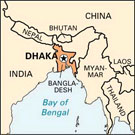World's rarest species of palm on verge of extinction in Bangladesh
 Dhaka - The full-blooming rachis shoots skyward from the top of the rarest species of wild palm in the world.
Dhaka - The full-blooming rachis shoots skyward from the top of the rarest species of wild palm in the world.
But the budding of the 10-metre tree is unusually depressing for Bangladesh's Dhaka University botanists studying it, for the flower forecasts its death.
With the death of what is the only known wild Corypha taliera in the world, the species will be extinct.
"Typically, its flowering causes death. It is sad that the wild plant of Corypha taliera class will go extinct in a few months," said professor Md Abul Hasan, chairman of the botany department at the country's leading university.
He said the department would collect seeds of the dying plant and make a desperate attempt to cultivate it.
"We cannot say whether it would be possible to produce the plant in botanical gardens," he said, referring to the development of one plant in such fashion at a Kolkata botanical garden a few years ago.
Hasan said no other wild specimen of the plant, which has been red-listed by the International Union for Conservation of Nature (IUCN), is known to exist in any part of the world. The plant class was first catalogued by Scottish botanist William Roxburgh in eastern India forests in the late 18th century.
In Bangladesh, the palm is called Tali. Local scientist Shamal Kumar Basu first identified the specimen on the Dhaka University campus.
According to the IUCN, another was found in Hawra Botanical Garden in the Indian state of West Bengal, but it did not grow in a natural environment; it was developed in the garden from its seeds.
Scientists at Dhaka University said they heard about another specimen in a village near Shantiniketan of West Bengal. As the plant produces horn-like flowers, the villagers identified it as a "ghost tree" - and chopped it down.
Bangladesh environmentalist Dwijen Sharma says there is limited scientific information on the Corypha taliera.
Professor Abdul Aziz of the university's botany department said his research team tried to develop the plant through tissue culture, but failed. They will now attempt to cultivate the last seeds. (dpa)